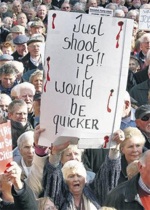
The Dublin government is under further pressure over the October Budget, days after thirty thousand pensioners and students besieged parliament over cutbacks.
An embarrasing u-turn by Taoiseach Brian Cowen on the issue of cuts in medical treatment for pensioners staved off a disaster in the face of a threatened revolt by his party’s TDs and supporters.
However, the government’s attempts to impose severe cuts and taxes in response to the downturn in the public finances has created a sense of national crisis and desperation, while the removal of universal health coverage for those over 70 continues to rankle.
Reports of waste, croneyism and inflated salaries in the public sector has fuelled the rising anger among the people, and the possibility of further Latin American-style rallies and upheaval remains.
Doubts have now been raised about the government’s willingness to pay the annual Christmas payment to social welfare recipients. A move to block the payment would be sure to spark further street protests.
A record 17 separate pieces of legislation must be passed through the 26-County parliament, with each likely to meet angry opposition and tense soul-searching among the government’s supporters.
This week, the coalition’s majority fell from 12 to 8 in the Dail, while independents Jackie Healy-Rae and Michael Lowry are under pressure to abandon their support for Cowen’s faltering premiership.
Labour has published the wording of a parliamentary motion calling on the Government to reverse its decision to increase the pupil-teacher ratio in primary and secondary schools, while the controversy over third-level registration continues.
Fine Gael has also warned it will also oppose the Government’s decision to disqualify teenagers with disabilities aged 16 and 17 from claiming the Disability Allowance.
Meanwhile, it has emerged that there are no government plans to change the policy that has seen it pay exorbitant rent for little-used office space and city centre parking spaces from developers and real estate moguls.
The nexus of Irish developers, bankers and Fianna Fail politicians, has long been blamed for Ireland’s massively inflated real estate prices and is now seen to be responsibe for the severity of the downturn in the 26-County economy.
Sinn Féin this week withdrew its support for the bail-out package of financial guarantees for the banking sector, citing flaws in the legislation and the government’s refusal to accept amendments to ensure accountability and limiting pay and bonuses for so-called ‘fat cat’ bank bosses.
A Fine Gael motion calling for a reversal of the decision to end automatic entitlement of the over-70s to a medical card was defeated by the Government on Wednesday.
In the vote, the Government had a majority of seven despite the defection to the Opposition of Joe Behan, who resigned from Fianna Fail last week, and Independent TD Finian McGrath, who had supported the Coalition since the last election.
A Government amendment to the Fine Gael motion was carried by 81 votes to 74. Former Taoiseach Bertie Ahern went through the division lobby on crutches.
With 15,000 protestors massed outside, there was little sense of achievement among Fianna Fail members in Leinster House. “Maybe this is what a revolution looks like,” said one Fianna Fail TD.
Speaking in China, where he is on a trade mission, Taoiseach Brian Cowen described his government’s u-turn as a “different solution” in the medical card controversy “which will hopefully meeting with broader public acceptance”.
Education is now set to be the big political issue in the week ahead with teachers threatening to send children home from school, as well as the Labour Party motion.
Meanwhile, the Irish Farmers’ Association (IFA has attacked the government over what it called an “outrageous and disproportionate attack on the farming community”.
The IFA is to hold a series of meetings of members around the country over how the Budget will affect farmers. The first will be held in Claremorris, Co Mayo, tonight. Further meeting are planned over the coming weeks.
IFA president Padraig Walshe said farmers were angry at being targeted in the Budget. He claimed cut in programes would hit the incomes of up to a hundred thousands farmers.
In addition, farmers would be badly affected by the new 1 per cent levy on all personal income, a key budget measure which remains mired in doubt and controversy.
“We now have a Government in crisis making up policy as it goes along,” said Sinn Féin Dail leader Caoimhghin O Caolain.
“Just six months into his term of office Brian Cowen has made one of the biggest Government climb-downs in the history of the state under pressure from his own back-benchers, the opposition and, crucially, the public at large.”
Mr O Caolain said it was “frightening” to think that a group of men and women sat around a Cabinet table in Government Buildings and approved the decision to re-impose means-testing for medical cards for the over 70s. He said he had never received so many representations in such a short time from so many people during his parliamentary career.
“Even looking at it from the crude point of view of political management this has been a disaster,” he said.
“More worrying still is that fundamental policy decisions on health and on taxation, affecting the lives of millions of people, could be taken in such a sloppy and irresponsible and ill-considered manner.”
Mr O Caolain also described as “pathetic” the role of the Green Party, who, he said, “played their part to the full” in the framing of the Budget.
“I would urge the public to continue to apply pressure on the Government to reverse other measures such as the decision to increase class sizes.”
![[Irish Republican News]](https://republican-news.org/graphics/title_gifs/rn.gif)
![[Irish Republican News]](https://republican-news.org/graphics/title_gifs/harp.gif)

